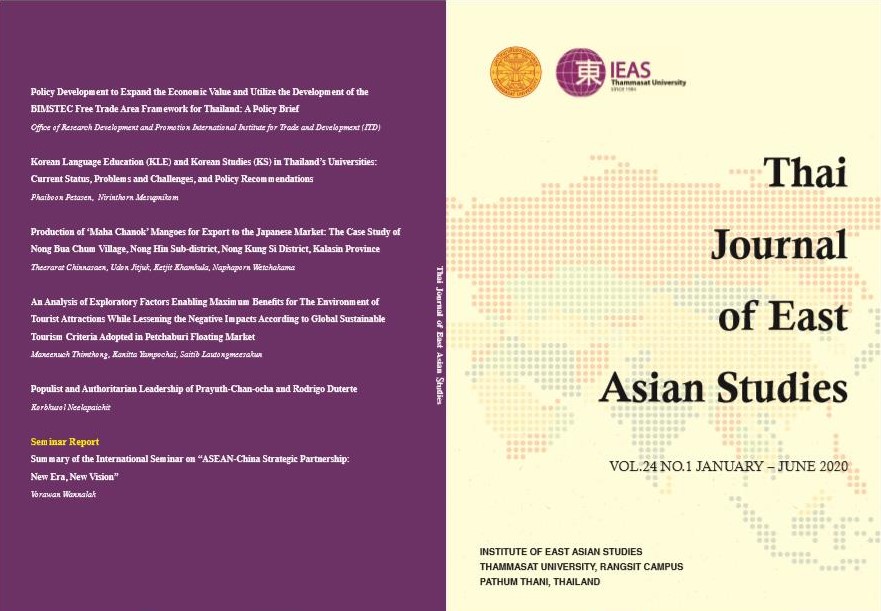Korean Language Education (KLE) and Korean Studies (KS) in Thailand’s Universities: Current Status, Problems and Challenges, and Policy Recommendations
Keywords:
Korean Language Education (KLE), Korean Studies (KS), universities, curricula, problems and challengesAbstract
This article focuses on exploring the current status of Korean language and Korean studies courses at universities in Thailand that offer these subjects as bachelor degree level majors, and aims to explore the relative problems and challenges. The methods of research are qualitative, and descriptive analysis, as guided by the conceptual framework of “curricula”. The results show that there are 11 universities that offer the Korean language as a major and one university that offers Korean studies as a major. It is more common for universities to offer general Korean language courses than Korean studies or Applied Korean for Career courses. However, there are recent efforts to increase the number of Korean studies and Applied Korean for Careers courses as these subjects help students to develop knowledge that can be utilized in their future careers. Thai lecturers are vital in advocating for universities to successfully upgrade their curricula into major subjects. The main problems and challenges in implementing the curricula as a major subject include not being able to offer all of the courses due to a lack of sufficient instructors, especially in subjects that require specialized knowledge; and that many students are only interested to study this subject because of the popularity of Korean culture, so they are not interested in some specific courses. This article suggests that the development of educational curricula should give importance to both quality and quantity.
Downloads
References
สาขาวิชาภาษาเกาหลี (หลักสูตรปรับปรุง พ.ศ.2556). https://bit.ly/2StVbkw คณะมนุษยศาสตร์และสังคมศาสตร์ มหาวิทยาลัยสงขลานครินทร์. (2562). หลักสูตรศิลปศาสตรบัณฑิต
สาขาวิชาภาษาเกาหลี. http://www.major.psu.ac.th/Human_major5.html คณะอกัษรศาสตร์ จฬุาลงกรณม์หาวทิยาลยั. (n.d.). ศลิปศาสตรมหาบณัฑติ สาขาวชิา เกาหลศีกึษา (นานาชาต)ิ. http://www.academic.chula.ac.th/search/showprogramsthai.asp?ID_Program=320241 คณะอักษรศาสตร์ มหาวิทยาลัยศิลปากร. (n.d.). หลักสูตรระดับปริญญาตรี. https://bit.ly/3bWJ9Il นสุรา ผ่องอำไพ (2561). บทเรยีนจากความสำเรจ็ของกระแสนยิมวฒันธรรมเกาหลี. http://industry-media.com มหาวิทยาลัยสงขลานครินทร์. (n.d.). รัฐบาลเกาหลีหนุนม.อ.พัฒนาหลักสูตรเกาหลีศึกษาเร่งผลักดันการสอน สู่ระดับมัธยมปลาย. http://w08.psu.ac.th/node/2334 ศูนย์วัฒนธรรมเกาหลี (n.d.). เกี่ยวกับ KCC. http://thailand.korean-culture.org/th สำนักงานคณะกรรมการการศึกษาขั้นพื้นฐาน. (2562, กันยายน 2). สพฐ. ร่วมเปิดการแข่งขันกล่าวสุนทรพจน์ ภาษาเกาหลีแห่งประเทศไทย. https://www.obec.go.th/archives/154200
สถานเอกอัครราชทูต ณ กรุงโซล. (n.d.). ความสัมพันธ์ไทย-สาธารณรัฐเกาหลี. http://www.thaiembassy.org/ seoul/th/relation/31117-Bilateral-relations.html สถานเอกอัครราชทูตสาธารณรัฐเกาหลี ประจำประเทศไทย (n.d.) ความสัมพันธ์ไทย-เกาหลี. http://overseas. mofa.go.kr/th
Atherton, J. S. (2010). Managing the hidden curriculum. http://www.doceo.co.uk/tools/hidden.htm Barrow, R., & Milburn, G. (1990). A critical dictionary of educational concepts. Harvester Wheatsheaf. Beauchamp, G. (1977). Basic components of a curriculum theory. In A. Bellack & H. Kliebard (Eds.), Curriculum and evaluation (p.22). McCutchan. Brady, L. (1995). Curriculum development. Prentice Hall. Faculty of International Studies, Prince of Songkla University. International Studies: Korea. https:// www.fis.psu.ac.th/en/international-studies-korea/ Gyusik, K. (2013). Status of Thai-Korea Cooperation in Education and Research Field and A Proposal for Its Development. Journal of the Korean Association of Thai Studies. 20(1), 124-157. Larprungrueng, S. (n.d.). Korean Studies in Thailand: Current status and future development.
http://cefia.aks.ac.kr:84/index.php?title=Korean_Studies_in_Thailand:_Current_Status_and_ Future_Development Pratt, D. (1994). Curriculum planning: A handbook for professionals. Harcourt Brace College Publishers. Rooster59. (2019, January 12). Uttaradit Rajabhat University offers Korean language teaching program. Thai Visa. https://forum.thaivisa.com/topic/1077850-uttaradit-rajabhat-university-offerskorean-language-teaching-program/ Sattathamkul, L. (2008). A study on learning Korean language of Thai students [Master’s thesis, Hankuk University of Foreign Studies, Seoul, South Korea]. http://m.riss.kr/search/detail/DetailView. do?p_mat_type=be54d9b8bc7cdb09&control_no=1558f3250a4d3c0affe0bdc3ef48d419 Song, S., & Pornsima, D. (n.d.). Motivation for learning among Thai students studying Korean as a foreign language in Thailand. Su, S. W. (2012). The various concepts of curriculum and the factors involved in curricula-making. Journal of Language Teaching and Research, 3(1), 153-158. Thandee, D. (2006). Continuity of Korean Studies in Thailand. http://www3.ru.ac.th/korea/article1/ article17.pdf Thandee, D. (n.d.). Koreans and Korean Studies in Thailand. http://www3.ru.ac.th/korea%20/korean_ wave_th/kwave37.pdf Tom, A. R. (1984). Teaching as a moral craft. Longman.
Wood, L., & Davis, B. G. (1978). Designing and evaluating higher education curricula. AAHE-ERIC/ Higher Education Research Report. 8. The American Association for Higher Education. Yinsen, P. (2012). The policy of Korean education in Thailand. Southeast Asia Journal, 21(3), 351-383.
Petasen, P. (2017). 태국 내 한국언어문화교육 및 탐마삿대학의 역할” in Proceeding of INK 23 rd , 한-태 한국언 어문화교육의 내용과 방법 –국제통용 한국어표준교육과정을 중심으로. [การศึกษาภาษาและวัฒนธรรม เกาหลใีนประเทศไทย : บทบาทของมหาวทิยาลยัธรรมศาสตร]์. pp. 25-37. The International Network for Korean Language and Culture.



